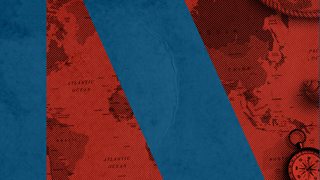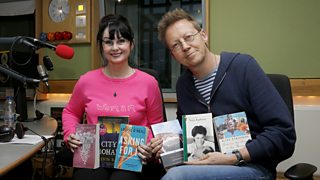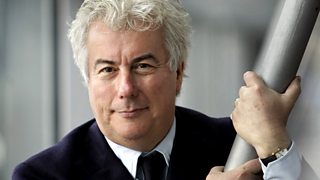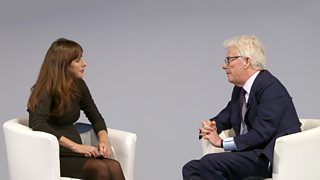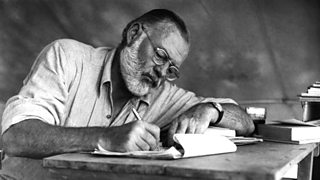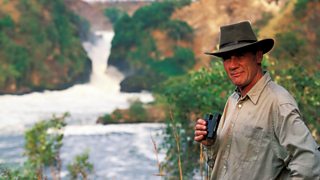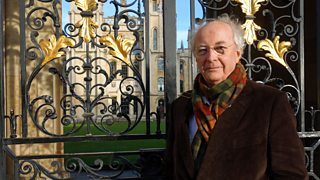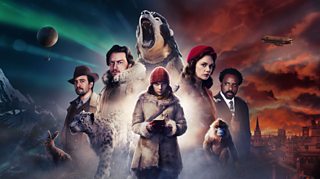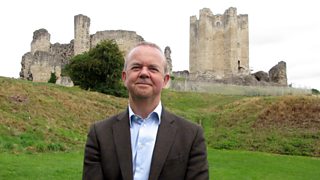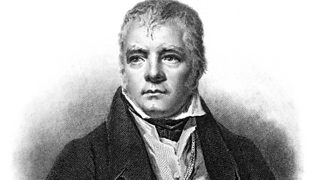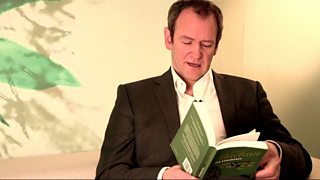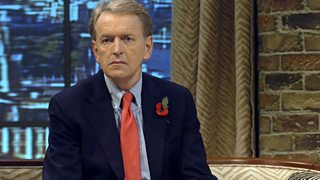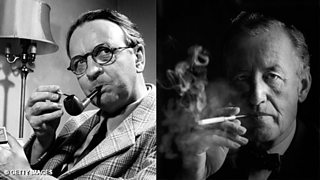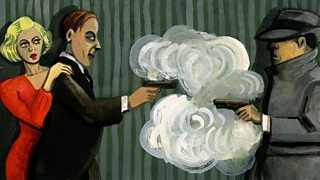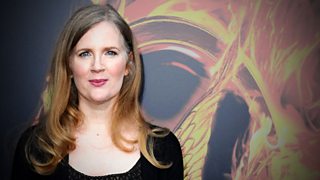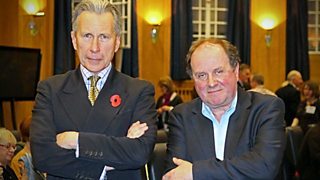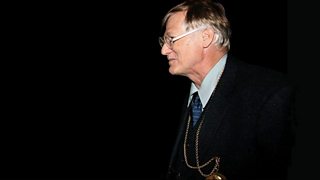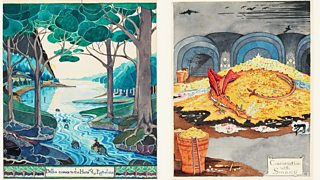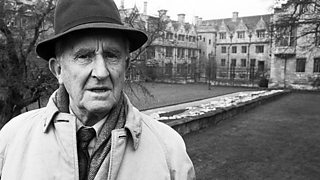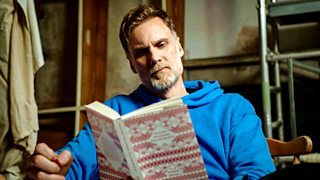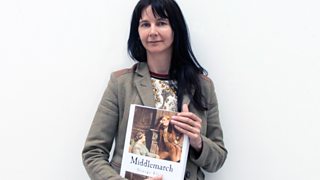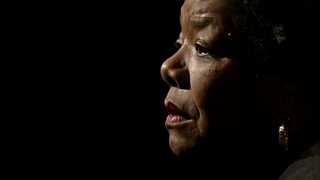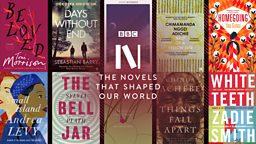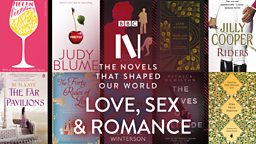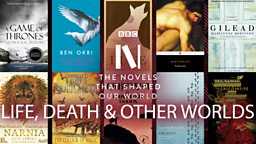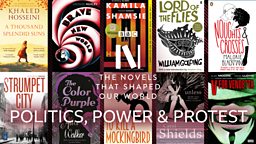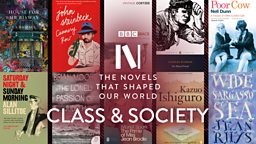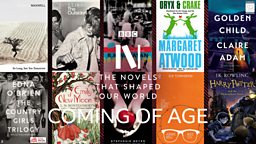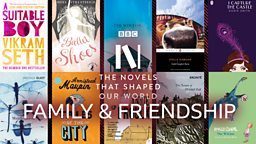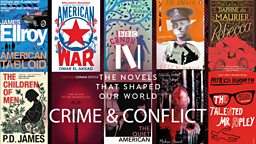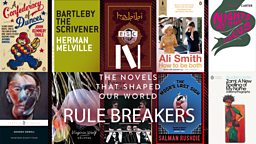Spine-tingling tales: 10 of the best adventure stories ever told
These ten novels take you on journeys of excitement and discovery, from Middle Earth in The Lord of the Rings Trilogy to 12th century England in Walter Scott’s Ivanhoe. Join Jack Aubrey as he sails around the world in Patrick O’Brian’s historical novels, and fight for your life with Katniss in Suzanne Collins’ The Hunger Games. Read on to begin your own novel adventure.
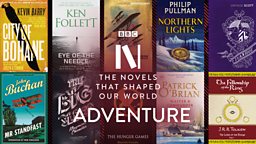
The panel have chosen chosen these novels on the theme of Adventure:
City of Bohane by Kevin Barry; Eye of the Needle by Ken Follett; For Whom the Bell Tolls by Ernest Hemingway; His Dark Materials Trilogy by Philip Pullman; Ivanhoe by Walter Scott; Mr Standfast by John Buchan; The Big Sleep by Raymond Chandler; The Hunger Games by Suzanne Collins; The Jack Aubrey Novels by Patrick O’Brian; The Lord of the Rings Trilogy by J.R.R. Tolkien.
The Novels Survey
-
![]()
Contribute to a people's list of best-loved adventure books and get personalised book recommendations.

City of Bohane by Kevin Barry, 2011
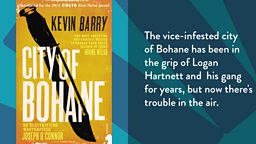
City of Bohane is set in a fictional, dystopian city on the west coast of Ireland in the year 2053 - a decayed city 'on its knees', full of vice, crime and violent clashes.
At the start the city is in the firm mob-rule of Logan Hartnett, but things are changing. Rival gang-leaders and rival love interests are starting to encroach into his space, and a menacing atmosphere hangs over the city.
Book Club Questions
1. This a bleak and dark novel but has often been described as funny, or even hilarious. Do you agree?
2. Logan is seen as an increasingly complex character as the novel progresses. What is your overriding opinion of him?
3. The language and descriptions in the novel are often hard to read. Did you find this added to the 'otherness' of the city, or did you find it a barrier to enjoying the novel?
Get Involved
-
![]()
Kevin Barry on Night Boat to Tangier
Acclaimed Irish writer Kevin Barry on his dark comedy, which has been billed as Waiting For Godot meets In Bruges.
-
![]()
Marian Keyes picks City of Bohane
Kevin Barry's novel is among six books chosen by author Marian Keyes for Simon Mayo's Desert Island Books feature.
Libraries are where we learn that we can live our lives through books.Kevin Barry

Eye of the Needle by Ken Follett, 1978
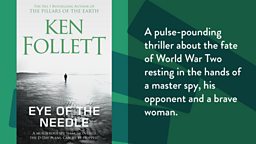
Hitler’s most prized undercover agent (known to MI5 as ‘The Needle’) is living in London and has kept his identity secret with a mixture of ingenuity and brutal disregard for human life.
Weeks before D-Day, he uncovers evidence of the Government’s invasion plans, which will turn the war in Britain’s favour. So ensues a race against time to escape and deliver his critical message to the German high command. The chase leads to a storm-battered island off the Scottish coast, where a daring young woman will change the course of his future forever.
Book Club Questions
1. How does the author explore the theme of loyalty in the story? Whether in relation to war and country, or marriage and family.
2. How do you feel about Henry Faber? Is he a villain or an anti-hero? Do your feelings about him change as the story progresses?
3. The author is incredibly economical in his use of language to establish characters and places. Does he do this effectively? Discuss how you think he makes the reader care about these characters.
Get Involved
-
![]()
LISTEN: Desert Island Discs - Ken Follett
From Ray Charles to Mozart, writer Ken Follett picked his Desert Island Discs with Sue Lawley in 2001.
-
![]()
Bestselling Welsh author Ken Follett published 10 novels before he hit the big time. He tells Hephzibah Anderson how he became a publishing sensation.
Somewhere deep inside me there’s a song-and-dance man. I wanted to write novels that millions of people would love.Ken Follett

For Whom the Bell Tolls by Ernest Hemingway, 1940
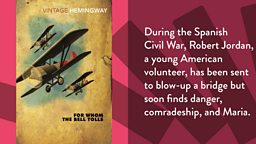
For Whom the Bell Tolls tells the story of Robert Jordan, an American volunteer for the anti-fascist forces in the Spanish Civil War. Jordan’s mission is to destroy a bridge, with the help of a group of local guerrilla fighters.
Despite betrayal from within the group and the knowledge that the enemy is aware of his mission and will attempt to betray it, Jordan determines to fulfil his mission. The novel draws on Hemingway’s own experiences and vividly describes the brutality of the Spanish Civil War.
Book Club Questions
1. Throughout the novel, Hemingway uses archaic language. What effect does this have and how does this affect the reader?
2. The hero of the novel is a foreigner. How does this affect his view of the war and why is he involved?
3. The novel draws strong parallels between sex and death. What is Hemingway saying about human nature?
Get Involved
-
![]()
LISTEN: Michael Palin on the life of Ernest Hemingway
Michael Palin and expert Naomi Wood discuss what makes Hemingway a twentieth century legend.
-
![]()
BOX SET: Michael Palin’s Hemingway Adventure
Over one hundred years after the birth of Ernest Hemingway, in 1999 Michael Palin followed in his footsteps across Europe, Asia and Africa.
The good parts of a book may be only something a writer is lucky enough to overhear or it may be the wreck of his whole damn life - and one is as good as the other.Ernest Hemingway, letter to F. Scott Fitzgerald, September 1929

His Dark Materials Trilogy by Philip Pullman, 1995 - 2000
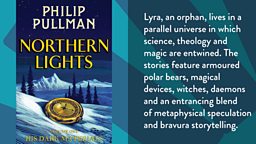
Lyra Balacqua is the young heroine of our story and spends her time roaming the rooftops and passageways of Jordan College, Oxford, with her spirit daemon, Pan.
When local children start to go missing, Lyra is drawn into a world of danger and intrigue and finds herself of interest to the all-powerful Magisterium. Her life changes forever when she meets the enigmatic Mrs Coulter and this sets her on a path to witches, ice bears and other worlds.
Book Club Questions
1. What devices does the author use to create the universe of Northern Lights? How does it differ from ‘our’ world and in what ways do those differences matter to the story?
2. Daemons are a representation of a person’s inner self akin to a soul. How does the author depict the unique bond between people and their daemons? If you had a daemon, what form would it take?
3. Which character (or group of characters) would you describe as the most powerful in the series?
Get Involved
-
![]()
WATCH: Philip Pullman's fantasy Oxford
Philip Pullman describes how the magical atmosphere of Oxford acted as an inspiration for the fantasy world of His Dark Materials.
-
![]()
WATCH & READ: 8 episodes plus behind the scenes features
The Βι¶ΉΤΌΕΔ adaptation of His Dark Materials; an epic tale of stolen children and the mysterious substance of Dust.
His Dark Materials really showed me the possibility and scope of young adult fiction. Let's be clear, the trilogy is revolutionary.Juno Dawson

Ivanhoe by Walter Scott, 1819
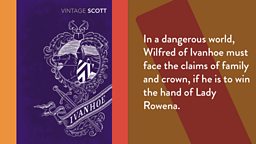
The Crusades and Robin Hood collide in this epic tale of Wilfred of Ivanhoe, a Saxon knight, returning to England in disguise after the holy wars.
Richard the Lionheart is imprisoned in Austria and Prince John is on the throne. This fast-paced, mediaeval adventure featuring a band of forest outlaws, and much jousting and feasting, peaks when Prince John's evil henchmen abduct Rowena and another beauty, Rebecca.
Book Club Questions
1. The knights in this book are ruled by codes of chivalry and heroism. Are these the most important attributes in this novel?
2. What is the significance of Rebecca’s character? How do she and Isaac reveal Scott’s views on the discrimination common at the time?
3. When this book was published it was subtitled, ‘A Romance’. Is it?
Get Involved
-
![]()
WATCH: Ivanhoe, the action hero of medieval times
Ian Hislop explores the strange Victorian cult of Medievalism, featuring castles and men in tights, as exemplified in Walter Scott's Ivanhoe.
-
![]()
LISTEN: Politician and author Rory Stewart on the life of Walter Scott
Politician, author and adventurer Rory Stewart chooses Scottish writer Sir Walter Scott as his Great Life.
Shakespeare and Scott are certainly alike in this: that they could both, if literature had failed, have earned a living as professional demagogues.GK Chesterton on Walter Scott

Mr Standfast by John Buchan, 1919
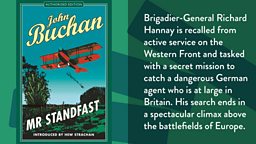
Following on from the events of The Thirty-Nine Steps and Greenmantle, Buchan’s third Richard Hannay novel is a classic spy thriller set during the First World War and ranging across the UK and Western Europe.
This early proponent of the genre mixes the tensions and conflicts of espionage with the brutality of the war, all seen through the nuance of Hannay’s reflections on the people and politics of the time. At once thrilling and heartfelt, it is a glorious novel full of danger, humanity and intrigue.
Book Club Questions
1. What do Hannay’s reflections tell you about the politics of the time? Were people divided by nationality, class, political belief, etc.?
2. How does the novel influence future espionage thrillers? What are the key components of the genre and how does this differ from other genres?
3. Why does Buchan write the book in the first person? What effect does this have?
Get Involved
-
![]()
WATCH: Alexander Armstrong's favourite childhood book is Mr Standfast
Alexander Armstrong reads an extract from his favourite childhood book, Mr Standfast by John Buchan. From My Life in Books.
-
![]()
LISTEN: Sir Christopher Meyer chooses the Richard Hannay adventures on Desert Island Discs
Sue Lawley's castaway is Sir Christopher Meyer, whose favourite book is actually four books by John Buchan: The Four Adventures of Richard Hannay - The 39 Steps, Greenmantle, Mr Standfast and the Three Hostages.
Whenever I saw John Buchan... I always felt ashamed in his presence that I was not more active.Historian GM Trevelyan

The Big Sleep by Raymond Chandler, 1939
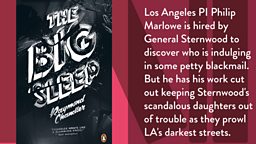
This classic of hard-boiled detective fiction introduces iconic private eye Philip Marlowe. While Marlowe’s task seems straightforward – resolve a blackmail case on behalf of the wealthy General Sternwood – Sternwood’s two wild daughters and their criminal connections draw the detective into a series of twists and turns.
Marlowe’s distinctive narrative voice and evocative descriptions make the scenery and characters of Depression-era Los Angeles’ corrupt underbelly come to life.
Book Club Questions
1. How does the novel define ‘morality’ and ‘moral decay’? In what ways is Marlowe’s moral code challenged by the actions of other characters?
2. How do characters pursue and wield power in The Big Sleep?
3. How is the reader’s understanding of femininity, as demonstrated by Carmen, Vivian, and Agnes’ characters, shaped by Marlowe’s narrative voice?
Get Involved
-
![]()
LISTEN: Ian Fleming and Raymond Chandler
In 1958, two masters of their genre, Fleming and Chandler, debate the difference between American and British thrillers.
-
![]()
WATCH: Philip Marlowe as inspiration for James Bond
Actor Toby Stephens discusses the enduring appeal of Chandler's writing and the inspiration for other writers to be found in protagonist Philip Marlowe.
Chandler's powerful but extremely depressing books should be read and judged, not as escape literature, but as works of art.WH Auden, 1948

The Hunger Games by Suzanne Collins, 2008 - 2010
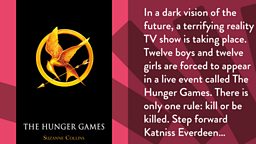
16-year-old Katniss Everdeen lives in Panem, a sovereign state in a post-apocalyptic future where young people are selected to battle to their deaths whilst the citizens of Panem watch on TV.
American novelist Suzanne Collins was inspired to write the novels after flicking between reality TV and coverage of the Iraq War and the books fuse these ideas into a disturbing dystopian world. The books explore the complexity of power and hope.
Book Club Questions
1. Are there any parallels that can be drawn between Panem and the way we live in 2020? Do you think The Hunger Games is trying to convey a message?
2. What is it about Katniss Everdeen that makes her so dangerous to the Capitol?
3. How does Katniss change after her experience in the novel?
Get Involved
-
![]()
LISTEN: The personal origins of Suzanne Collins' The Hunger Games
Collins' trilogy, set in a post-apocalypse America, is said to have been inspired by Greek myth and reality television, as well as Collins' own upbringing as the daughter of a US Air Force officer who served in Vietnam.
-
![]()
LISTEN: What does The Hunger Games have in common with Duras' The Lover?
Answer - A desire to survive. US financier Terri Duhon - 'a Harley Davidson-riding maths whiz from rural Louisiana' - chooses The Hunger Games on A Good Read.
The considerable strength of the novel comes in Collins’s convincingly detailed world-building and her memorably complex and fascinating heroine.John Green in the New York Times

The Jack Aubrey Novels by Patrick O’Brian, 1969 - 2004
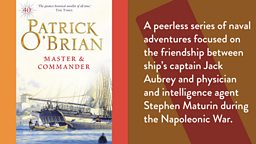
Set during the Napoleonic Wars, this series of novels tells the story of Captain Jack Aubrey and his time at sea aboard a ‘man-of-war’ – his rise through the ranks, his command of his boat, and the actions and adventures he faces both at sea and on land.
Book Club Questions
1. O’Brian is famously detailed in his historical setting, including the minutiae of life at sea – did you find this appealing, or a hindrance to the pace and action of the novel?
2. Whilst an accomplished Captain, Jack Aubrey’s faults and ambitions are also laid bare – did you warm to him as a central protagonist; do you feel he is presented as a hero?
3. There are over 20 books in the Aubrey-Maturin series. Do you think they can be read as stand-alone works, or should they be read as a series?
Get Involved
-
![]()
LISTEN: Celebrating Patrick O'Brian's Master and Commander
In a special 200th edition of Bookclub, James Naughtie celebrates the centenary of author Patrick O'Brian.
-
![]()
LISTEN: Architect Nicholas Grimshaw chooses Patrick O'Brian on Desert Island Discs
Sue Lawley's castaway is the architect Sir Nicholas Grimshaw, who in 2003 chose the complete works of Patrick O'Brian.
O’Brian skewers the pompous in their own words. It’s Jane Austen at sea.Lucy Eyre in The Guardian

The Lord of the Rings Trilogy by J.R.R. Tolkien, 1954 - 1955
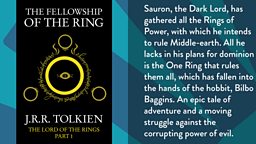
One of the most seminal fantasy adventures, and best-selling series of all time, the narrative of The Lord of the Rings draws on Norse mythology, Old English and folklore through to the English countryside and Tolkien’s own experiences in WWI.
The trilogy sees Frodo and a Fellowship of the inhabitants of Middle Earth set out on a quest to prevent the dark forces of Sauron from reclaiming the one ring of power.
Book Club Questions
1. How does the plot of the quest narrative compare to other adventure stories?
2. What influence has this series had on subsequent writers and books? What about its wider cultural impact?
3. Discuss the relationship between the high-fantasy world of Middle Earth and the early 20th Century world in which it was written.
Get Involved
-
![]()
READ: Middle-earth in colour: How Tolkien drew his fantasy universe
The author of The Hobbit and The Lord of the Rings, the most influential fantasy novels ever written, also created stunning illustrations of his Middle-earth universe.
-
![]()
WATCH: JRR Tolkien interviewed in 1968
John Izzard meets JRR Tolkien, walking with him through the Oxford locations that he loves while hearing the author's own views about his wildly successful high-fantasy novels.
By the time one has finished his book one knows the histories of Hobbits, Elves, Dwarves and the landscape they inhabit as well as one knows one’s own childhood.WH Auden in the New York Times Book Review, 1954

Book Club Questions on Adventure
To round off our 10 novels in the Adventure theme, here are five stimulating questions to ponder. And below, to continue exploring, try our further reading suggestions.
1. Many adventure novels take place in other periods of history, or worlds other than the context in which they are written. Why do you think this is?
2. Adventure has been a common theme throughout the history of fiction, dating back to Mediaeval stories. Why do you think it has stood the test of time and is still so popular?
3. Many adventure novels include a journey. What do you think this adds to the stories?
4. Adventure writing overlaps with other genres, including thrillers, crime and even romance. Why do you think it’s so adaptable?
5. What do you think creates a good adventure novel?

The Novels Survey
-
![]()
Contribute to a people's list of best-loved adventure books and get personalised book recommendations.
More novels exploring Adventure
Codename Villanelle by Luke Jennings
Fatherland by Robert Harris
Shantaram by Gregory David Roberts
The Flashman Papers series by George MacDonald Fraser
The Spy Who Came in From the Cold by John le Carré
To the Lions by Holly Watt
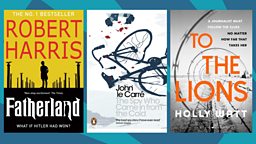

- Produced with support from
- Most of the books on the Novels 100 list are available in various formats from the .

- Novels That Shaped Our World is run in partnership with and is supported by .
Get Involved
-
![]()
Share the book you love on Twitter
-
![]()
Tell us about the novels you love on Facebook
-
![]()
Show us a book (or books) you love using the hashtag #mybooklife
Brilliant books content on Βι¶ΉΤΌΕΔ iPlayer
-
![]()
Novels That Shaped Our World
Looking at class in all its shapes and sizes, from all sides of the class divide, in the UK, USA and India
-
![]()
Everything Is Connected - George Eliot's Life
Gillian Wearing's experimental film, made up of a diverse cast of people, celebrate the legacy of the Victorian author
-
![]()
Face to Face: Maya Angelou
In this classic interview from 1994, Jeremy Isaacs talks to Maya Angelou about her life, her writing and her hopes for the future
